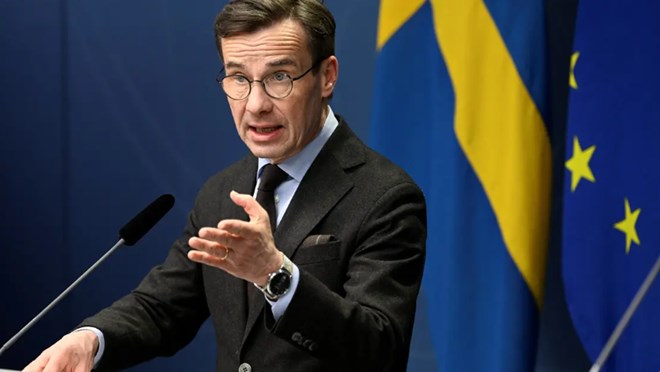
Friday July 28, 2023

Swedish Prime Minister Ulf Kristersson speaks during a news conference in Stockholm, Sweden January 16, 2023. (Reuters)
Sweden’s government on Thursday ordered 15 government agencies to strengthen the country’s ability to prevent terrorism, in response to a worsened security situation following protests involving desecration of the Quran.
Tensions have flared between Sweden and several Middle Eastern nations after an Iraqi refugee staged two protests in which he desecrated the Quran.
“Recent destructive events -- in particular various demonstrative burnings -- have increased the risks for Sweden,” Prime Minister Ulf Kristersson said in a statement posted to Instagram.
“We have, according to the Swedish Security Service, gone from being what is called a legitimate target for terror attacks, to being a prioritized target,” he continued, noting that the situation was “very serious.”
As a result, 15 government agencies -- including Sweden’s armed forces, several law enforcement agencies and the Swedish tax agency -- had been tasked with “intensifying their work” under the leadership of the security service.
Speaking at a press conference, Justice Minister Gunnar Strommer said the work would seek to strengthen Sweden’s “ability to prevent, deter and impede terrorism and violent extremism.”
The announcement comes a day after Sweden’s government said the country had become the target of disinformation campaigns.
In late June, Salwan Momika, 37, set pages of the Muslim holy text alight outside Stockholm’s main mosque.
Last week he staged a similar protest outside Iraq’s embassy, stomping on the Quran but leaving before burning it.
Advance news of the planned Stockholm protest had prompted hundreds of Iraqis to mass at Sweden’s Baghdad embassy the night before -- as they did in response to June’s Quran burning -- before scaling the walls and torching buildings.
Sweden’s government has condemned the desecrations, while stressing the country’s constitutionally protected freedoms of speech and assembly.
The two events also followed a January protest where Swedish-Danish right-wing activist Rasmus Paludan burned a Quran to denounce Sweden’s membership application to NATO and the negotiations with Turkey to allow Sweden to join the alliance.
Abandoning centuries of military non-alignment, Sweden decided to apply for NATO membership in the wake of Russia’s invasion of Ukraine, but its membership is still awaiting ratification by Hungary and Turkey -- which has condemned the burnings.
Recent events have raised diplomatic tensions throughout the Middle East, with Swedish envoys summoned in Egypt, Algeria, Saudi Arabia, Jordan and the United Arab Emirates.
Sweden’s ambassador has been expelled from Iraq, while Iran said it would not allow a new Swedish ambassador into the country.